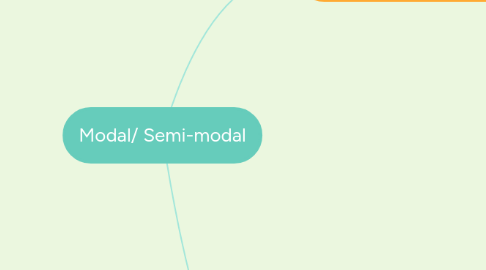Modal/ Semi-modal
作者:Araujo Casanova Odalis Alejandra


1. We use modal verbs to modify the meaning of the main verb.
1.1. Can/could
1.1.1. Ability, permission, request, advice
1.2. Will / Shall
1.2.1. Future/ willingness/ promises and offers/ conditional sentences
1.3. May/ might/ could
1.3.1. Possibility/ permission
1.4. Would/ would have
1.4.1. Requests/ past of will/ conditional sentences/ habits
1.5. Must/ mustn't
1.5.1. Rules/ obligation
1.6. Should/ shouldn't
1.6.1. Recommendation/ advice
1.7. Should have/ shouldn't have
1.7.1. Regret/ criticism
1.8. Needn't/ needn't have
1.8.1. Lack of obligation
1.9. May be/ might be/ must be/ can't + be/ +be -ing form
1.9.1. Speculation about the present
1.10. May have/ might have/ must have/ can't have+past participle/ +been -ing form
1.10.1. Speculation about past
1.11. Could have/ couldn't have
1.11.1. Possibility in the past/ critisism
1.12. Will have
1.12.1. Future completion
2. Semi-modal verbs have some of the characteristics of modals, but not all.
2.1. Have to/ had to/ have got to
2.1.1. Rules/ obligation
2.2. Don't have to/ didn't have to
2.2.1. Lack of obligation
2.3. Ought to
2.3.1. Obligation/ advise
2.4. Need to
2.4.1. Necessity/ instructions/ guidance
2.5. Don't need to/ didn't need to
2.5.1. Lack of obligation
2.6. Would like/ would like to
2.6.1. Offers/ invitations/preferences
2.7. Be able to
2.7.1. Ability/ infinitive of can

